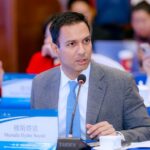ISLAMABAD: The National Assembly on Monday adopted a resolution expressing concern over hanging of Jamaat-i-Islami (JI) Bangladesh leader Abdul Qadir Mullah for his loyalty with Pakistan during the events of 1971.
The resolution moved by the JI lawmaker Sher Akbar Khan also expressed condolences with Bangladesh and family members of Abdul Qadir Mullah.
The House demanded of the Bangladeshi government not to resurrect the issues of 1971 and end all cases against leaders of JI Bangladesh through the spirit of understanding.
Rising on a point of order‚ the Federal Interio Minister Chaudhry Nisar Ali Khan said 42 years ago we witnessed the tragedy of fall of Dhaka but unfortunately we seem to have not learnt any lesson.
The interior minister said still we react in a violent manner‚ do not respect others and despite claims about democracy our attitudes are not democratic. He said it is an occasion to carry out self-analysis as to what we achieved and lost in forty-two years.
Nisar said the JI wants to bring a resolution on the issue and the government would support it. The Pakistan People Party’s (PPP) Abdul Sattar Bachani said the issue pertains to an independent and sovereign country and we should not interfere in the internal affairs of Bangladesh.
The Pakistan Tehreek-e-Insaf (PTI) leader Makhdoom Javed Hashmi‚ Awami Muslim League (AML) leader Sheikh Rashid Ahmad‚ Pakistan Muslim League-Quaid’s (PML-Q) Raza Hayat Hiraj and Jamiat Ulema-e-Islam-Fazl (JUI-F) MNA Maulana Ameer Zaman said the JI leader was eliminated because of his loyalty with Pakistan.
The Muttahida Qaumi Movement (MQM) lawmaker Abdul Waseem said we should learn lesson and ruminate how to avoid national tragedies in future.
The PTI Chairman Imran Khan said lawyer of an international human rights organization called Reprieve‚ who was defending the case of 93 year old Abdul Qadir Mullah‚ told him that the JI leader was innocent and had nothing to do with the charges against him.
Imran Khan said fall of Dhaka tragedy gives us a lesson that issues should be handled democratically and not through military operations.






